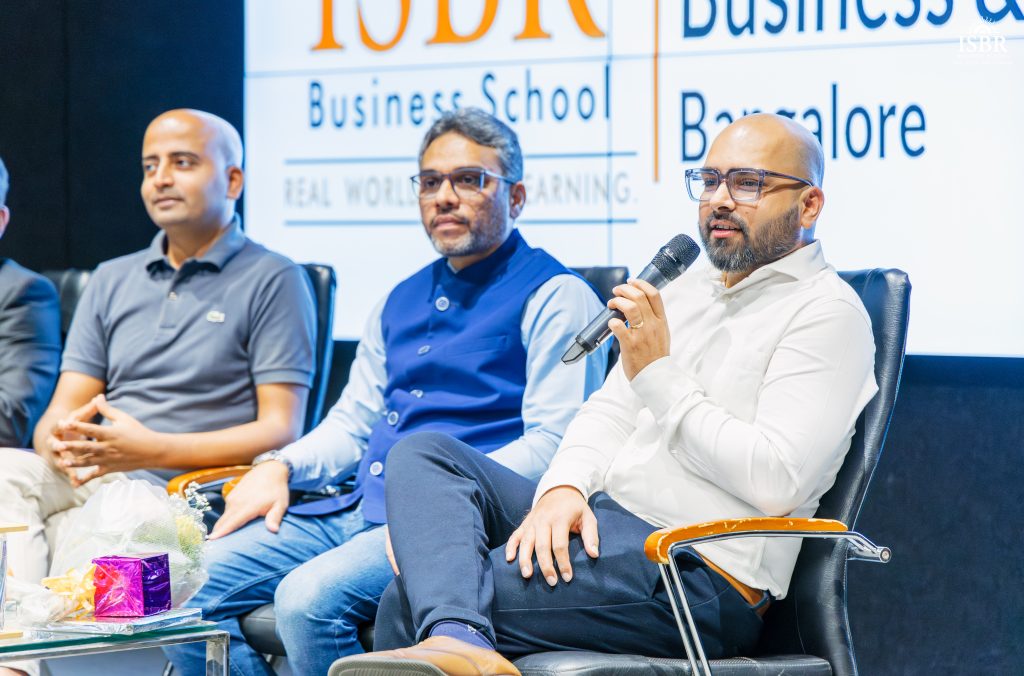The financial world is at a crossroads. As technology continues to disrupt traditional banking, the big question remains: Will fintech and banks compete or collaborate to redefine the future of finance? This was the central theme of a dynamic panel discussion held at ISBR Business School. With an esteemed lineup of experts—including industry leaders from JP Morgan, HSBC, and emerging fintech pioneers—the event shed light on the evolving landscape of banking and fintech.
The Battle of Evolution: Banks vs. Fintech
Traditional banks are no longer resisting digital transformation; they are embracing it.
Mr. Rudra Kumar, Chief Control Officer at HSBC, highlighted how major banks are integrating fintech innovations to stay relevant. However, fintech startups continue to challenge the status quo, bringing agility, personalized financial products, and seamless digital experiences. The debate revolved around whether banks will morph into fintech-like entities or whether fintechs will carve their own independent path.

Regulation: The Fine Line Between Innovation and Compliance
Fintech’s rise comes with a crucial challenge—regulation.
Abhishek Sharma, Founder of The Think School, delved into the evolving guidelines set by the Reserve Bank of India (RBI). While fintech firms push boundaries with disruptive solutions, they must navigate an intricate web of compliance. The panelists agreed: innovation cannot come at the cost of financial security and regulatory integrity.

The Fintech Profitability Dilemma
Startups in the fintech space often operate on razor-thin margins, raising concerns about long-term financial sustainability.
Pranav Koomar, Founder of Plus Cash, shared insights into the struggles of securing funding and maintaining profitability. The discussion revolved around strategies for fintech firms to scale sustainably, including collaborations with banks and leveraging data-driven decision-making.

AI and the Digital Finance Revolution
Artificial intelligence is reshaping financial services at an unprecedented pace.
Aditya Tiwari, VP at JP Morgan, emphasized the role of AI in digital lending, embedded finance, and fraud detection. While AI-driven finance unlocks endless possibilities, it also introduces risks—especially concerning data privacy and cybersecurity. The panelists debated the delicate balance between leveraging AI for efficiency and ensuring customer trust.

Trust: The Key to Fintech’s Long-Term Success
While fintech firms offer convenience and innovation, they must build trust to truly compete with traditional banks. Rudra Kumar stressed the importance of credibility, emphasizing that customers still seek the security and reliability of well-established financial institutions. The discussion highlighted how fintech startups can enhance trust through transparency, regulatory compliance, and customer-centric approaches.
The Rise of BNPL and Responsible Lending
Buy Now, Pay Later (BNPL) services have surged in popularity, but they come with risks. Abhishek Sharma and Aditya Tiwari explored how BNPL’s rapid growth could lead to over-lending and financial instability. The panel underscored the need for responsible lending strategies to prevent defaults and ensure sustainable credit ecosystems.
Fintech’s Investment Challenges in a Shifting Market
The funding landscape for fintech startups has become increasingly volatile. Pranav Koomar shared firsthand experiences of navigating investment slowdowns and advised emerging entrepreneurs on securing capital amid uncertainty. The discussion underscored the importance of resilience, strategic partnerships, and a strong business model.
The Future of Finance: What’s Next?
As the panel wrapped up, one key question remained: What will banking and fintech look like in 2035? The consensus was clear—coexistence is inevitable. Banks and fintech firms must collaborate to create a seamless, tech-driven financial ecosystem. The key to success? Adaptability, trust, and continuous innovation.
The event concluded with an engaging Q&A session, where students and professionals had the opportunity to interact directly with the panelists. As fintech continues to reshape finance, one thing is certain—change is the only constant, and those who embrace it will define the future of banking.
About ISBR Business School: ISBR Business School, located in Bangalore, India, is a premier institution dedicated to providing world-class education in business and management. Accredited by the NBA and recognized by the Association of Indian Universities and the Ministry of HRD, Government of India, ISBR has consistently been ranked as a platinum institute by AICTE-CII. With a diverse student body, a strong emphasis on industry collaboration, and a curriculum designed to foster innovation and leadership, ISBR Business School is committed to shaping the business leaders of tomorrow. The school’s robust placement record and partnerships with top global companies underscore its commitment to excellence and career readiness for its students

